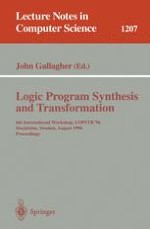1997 | Buch
Logic Program Synthesis and Transformation
6th International Workshop, LOPSTR'96 Stockholm, Sweden, August 28–30, 1996 Proceedings
herausgegeben von: John Gallagher
Verlag: Springer Berlin Heidelberg
Buchreihe : Lecture Notes in Computer Science
Enthalten in: Professional Book Archive
